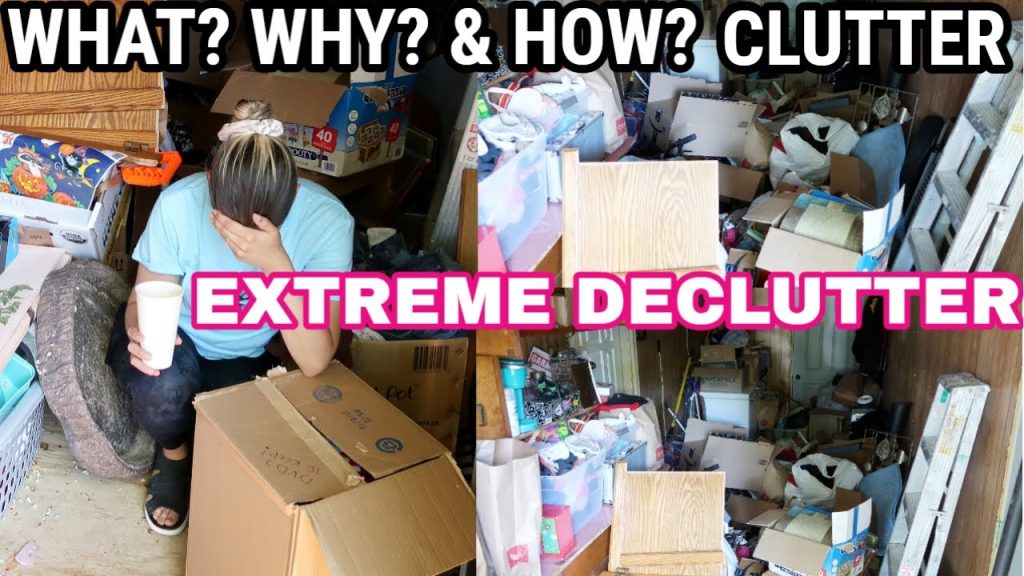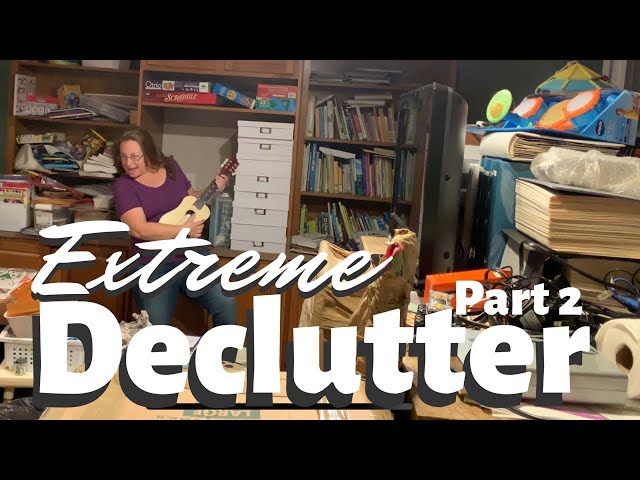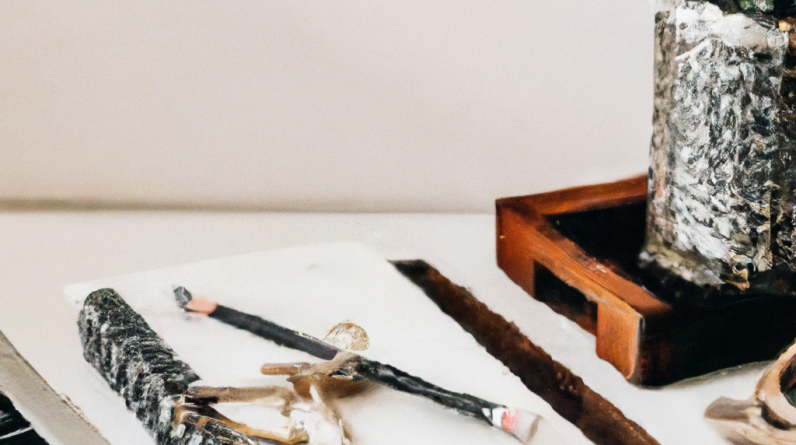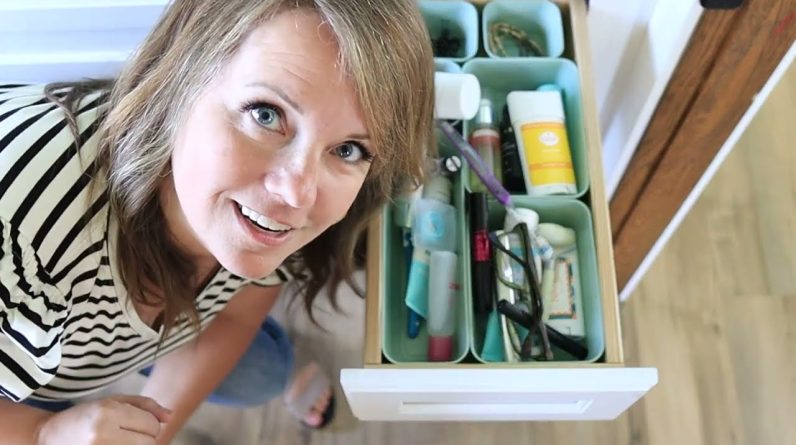
Are you overwhelmed by the clutter in your life? It’s time to discover the art of extreme decluttering. This article will introduce you to the concept of minimalism and how it can transform your living space and improve your overall well-being. Say goodbye to the unnecessary chaos and embrace a simpler, more organized lifestyle through the power of extreme decluttering. Get ready to create a space that truly reflects who you are and allows you to focus on the things that truly matter.
Table of Contents
Why Extreme Decluttering?
Benefits of extreme decluttering
Extreme decluttering, also known as minimalism, is a practice that involves reducing the number of possessions to only the essentials. While it may seem daunting at first, this process offers numerous benefits that can greatly improve your life. By clearing out the physical clutter, you also create space for mental clarity, better focus, reduced stress, a sense of calm, and improved decision-making.
The connection between extreme decluttering and minimalism
Extreme decluttering and minimalism go hand in hand. Minimalism is a philosophy that emphasizes living with intention and purpose, focusing on what truly matters. By adopting extreme decluttering, you align yourself with the principles of minimalism and simplify your life in profound ways.
Preparing for Extreme Decluttering
Setting clear decluttering goals
Before diving into extreme decluttering, it’s important to set clear goals for yourself. Determine what you hope to achieve through this process. Do you want to create a more organized living space? Reduce your environmental impact? Improve your mental wellbeing? Setting goals will provide you with a roadmap to follow and keep you motivated throughout the journey.
Creating a decluttering plan
Once you have established your goals, it’s time to create a plan for decluttering. Start by identifying the areas in your home that need the most attention. Break down the process into manageable tasks, such as decluttering one room at a time or focusing on specific categories of items. Having a plan in place will help you stay organized and track your progress.
Gathering necessary supplies
Before embarking on your extreme decluttering journey, gather the necessary supplies. This may include garbage bags, storage containers, labels, cleaning supplies, and any other tools that will aid you in the process. Having everything readily available will make the decluttering process smoother and more efficient.
Building a support system
Extreme decluttering can be a challenging and emotional process. It’s important to have a support system in place to lean on during this time. Reach out to friends or family members who can offer encouragement, guidance, or even lend a helping hand. Alternatively, consider joining online communities or support groups where you can connect with like-minded individuals going through the same journey.

The Process of Extreme Decluttering
Sorting and categorizing possessions
The first step in extreme decluttering is to sort and categorize your possessions. Start by emptying out an area, such as a closet or a room, and categorize items into groups. This will allow you to see the extent of your belongings and make decisions on what to keep, donate, or discard.
The 80/20 rule and prioritizing
When decluttering, it’s important to prioritize your items. The 80/20 rule, also known as the Pareto Principle, suggests that we use 20% of our possessions 80% of the time. Apply this concept when making decisions. Focus on keeping items that are essential, meaningful, or frequently used, and let go of the rest.
Deciding what to keep, donate, or discard
Once you have sorted and prioritized your possessions, it’s time to make decisions on what to keep, donate, or discard. Ask yourself important questions about each item. Does it serve a purpose in your life? Does it bring you joy? Is it truly necessary? Be honest with yourself and let go of things that no longer serve a purpose or contribute to your overall well-being.
Letting go of sentimental items
One of the most challenging aspects of extreme decluttering is letting go of sentimental items. Sentimental items often hold emotional attachments and memories. However, it’s important to remember that memories reside within us, not within the physical objects. Consider taking photos of sentimental items and creating a digital or physical memory book to honor the memories while still letting go of the physical clutter.
Dealing with emotional attachment
Throughout the decluttering process, you may encounter emotional attachment to certain possessions. It’s natural to feel a sense of nostalgia or fear when parting with items. Take time to acknowledge and process these emotions. Remind yourself of the benefits of decluttering and how it will positively impact your life. Gradually let go of emotional attachments and embrace a more minimalist mindset.
Organizing After Extreme Decluttering
Designing functional storage systems
Once you have decluttered your space, it’s time to organize the remaining items in a functional and efficient manner. Design storage systems that fit your specific needs. Consider using storage bins, shelves, or baskets to keep things tidy and easily accessible. Maximize the use of your space by utilizing vertical storage and creating designated areas for different categories of items.
Implementing effective organization methods
To maintain organization, consider implementing effective organization methods. Some popular methods include the KonMari method, which focuses on organizing by category and keeping only items that spark joy, or the “one in, one out” method, where you commit to getting rid of one item every time you bring a new one in. Find a system that resonates with you and helps you maintain a clutter-free space.
Creating designated spaces for each item
Assigning a designated space for each item is crucial in maintaining an organized and clutter-free environment. When everything has its place, it becomes easier to find and put things away. Consider labeling shelves, drawers, or containers to ensure that items are returned to their designated spots. This practice helps prevent clutter from accumulating and makes tidying up a breeze.
Avoiding clutter creep and maintaining organization
One of the challenges after extreme decluttering is avoiding clutter creep. To prevent this, practice mindful consumerism and be conscious of what you bring into your space. Regularly assess your belongings and make sure they align with your goals and values. Implementing regular maintenance decluttering sessions will help keep your home organized and clutter-free in the long run.

The Psychological Impact of Extreme Decluttering
Enhancing mental clarity and focus
One of the notable psychological benefits of extreme decluttering is enhanced mental clarity and focus. A clutter-free environment promotes a clear and focused mind, allowing you to think more clearly and be more productive in various areas of your life. When there are fewer distractions and visual stimuli, you can concentrate on the tasks at hand with greater ease.
Reducing stress and anxiety
Living in a cluttered space can contribute to increased stress and anxiety levels. The constant visual reminder of unfinished tasks and disorganization can weigh heavily on our minds. By embarking on an extreme decluttering journey, you create a space that promotes relaxation and tranquility, reducing stress and anxiety. The act of decluttering itself can also be a therapeutic and cathartic process.
Creating a sense of calm and peace
A clutter-free living environment can create a sense of calm and peace in your life. Physical clutter often translates to mental clutter, adding unnecessary noise and chaos to our daily lives. By practicing extreme decluttering, you intentionally design a space that fosters a peaceful atmosphere, allowing you to fully relax and recharge.
Promoting better decision-making
Extreme decluttering teaches us to become more mindful and intentional in our decision-making. When every item has to earn its place in our lives, we become more discerning in what we choose to keep. This mindset can carry over into other aspects of our lives, helping us make better decisions about our relationships, commitments, and overall priorities.
Sustainable Decluttering Practices
Purchasing consciously and thoughtfully
To maintain the benefits of extreme decluttering, it’s important to adopt conscious and thoughtful purchasing habits. Before making a purchase, ask yourself if the item aligns with your goals and values. Consider the quality, utility, and longevity of the item. By making mindful choices, you reduce the likelihood of accumulating unnecessary clutter in the future.
Adopting a one-in-one-out policy
To prevent the accumulation of excess belongings, adopt a one-in-one-out policy. For every new item you bring into your space, commit to getting rid of an existing item. This practice ensures that your possessions remain in check and helps maintain the progress achieved through extreme decluttering.
Regular decluttering maintenance
Extreme decluttering is not a one-time process but a continuous journey. Make decluttering a regular part of your routine. Set aside time, whether weekly, monthly, or seasonal, to evaluate your belongings and re-assess their value. Regular maintenance decluttering sessions will keep your space organized and prevent clutter from building up again.
Donating and recycling responsibly
When letting go of items during extreme decluttering, be mindful of donating and recycling responsibly. Research local charities or organizations that accept donations and support causes you believe in. Ensure that the items you donate are in good condition and can be of use to others. Similarly, recycle any items that are recyclable to minimize waste and reduce environmental impact.
Minimizing waste and excess
In line with sustainable practices, it’s important to minimize waste and excess. Consider embracing a more minimalist lifestyle beyond decluttering. Reduce your consumption of single-use items, repair and repurpose items when possible, and strive to live a more eco-friendly lifestyle. By embracing minimalism and sustainable practices, you contribute to a healthier planet and a more intentional life.

Challenges and Roadblocks in Extreme Decluttering
Overcoming sentimental attachment
One of the significant challenges in extreme decluttering is overcoming sentimental attachment to possessions. Sentimental items often represent cherished memories or hold emotional significance. To navigate this challenge, take time to reflect on the memories associated with the item rather than the physical item itself. Focus on preserving the memories while letting go of the physical clutter.
Resisting the urge to hoard
Habits of accumulation and hoarding can hinder the process of extreme decluttering. It’s essential to recognize and resist the urge to hold onto items out of fear or a false sense of security. Challenge yourself to adopt a more minimalist mindset, where you prioritize quality over quantity and detach value from material possessions.
Dealing with the fear of letting go
Fear of letting go is a common roadblock in extreme decluttering. The fear of losing something we might need or regretting the decision to discard can be paralyzing. However, it’s important to recognize that most of these fears are unfounded. Start with small steps and gradually let go of items that no longer serve a purpose or bring joy. Remind yourself of the benefits of decluttering and the freedom it brings.
Navigating family and social pressures
Extreme decluttering may not align with the values or lifestyle choices of family members or friends. Navigating family and social pressures can be challenging, but it’s essential to stay true to your own goals and priorities. Communicate your reasons for embarking on this journey and seek support from like-minded individuals. Remember, it is your space and your life, and you have the right to create an environment that aligns with your values.
Finding motivation during the process
Maintaining motivation throughout the extreme decluttering process can be difficult, especially when faced with challenging decisions or enduring tedious tasks. To stay motivated, remind yourself of the ultimate goal and the benefits you will reap. Break the process down into smaller, manageable tasks and celebrate each accomplishment along the way. Seek inspiration from others who have successfully decluttered their lives and remember the positive impact this journey will have on your mental and physical well-being.
Life After Extreme Decluttering
Experiencing the benefits of a clutter-free space
After undergoing extreme decluttering, you will experience the numerous benefits of a clutter-free space. From the mental clarity and improved focus to reduced stress and anxiety, you will find that your overall well-being improves. Enjoy the simplicity and freedom that comes with a minimalist lifestyle and appreciate the newfound ease in maintaining an organized home.
New habits to maintain a minimalist lifestyle
Extreme decluttering is not just a one-time process but a lifestyle change. To maintain the benefits and prevent clutter from accumulating again, develop new habits that embrace minimalism. Continuously evaluate your purchases, regularly declutter, and be intentional about the items you bring into your space. Embrace the mindset of “less is more.”
The potential for increased productivity
A cluttered environment often leads to distractions and inefficiencies. By embracing extreme decluttering and creating a clean and organized space, you open up opportunities for increased productivity. With fewer visual distractions and a clear mind, you can focus on your priorities and achieve your goals with greater efficiency.
Creating a positive impact on mental and physical health
Living in a clutter-free environment has a positive impact on both mental and physical health. The reduced stress and anxiety levels, combined with the sense of calm and peace, contribute to improved mental well-being. Additionally, a decluttered space is easier to clean and maintain, promoting physical health and reducing the risk of allergens or dust-related issues.

Extreme Decluttering Tips and Tricks
Start small and tackle one area at a time
When embarking on extreme decluttering, it’s best to start small and tackle one area at a time. By focusing on one room, closet, or category of items, you can prevent overwhelm and stay motivated. Gradually expand to larger areas as you gain confidence and experience the benefits of decluttering.
Use a decluttering checklist or guide
Having a decluttering checklist or guide can help keep you on track and ensure that you don’t overlook any areas in your home. Many resources provide step-by-step instructions or suggestions on decluttering different spaces. Utilize these tools to stay organized and maintain a systematic approach throughout the decluttering process.
Set time limits and avoid procrastination
Decluttering can be time-consuming, and it’s easy to fall into the trap of procrastination. Set specific time limits for each decluttering session to maintain focus and avoid becoming overwhelmed. Even short bursts of dedicated time can lead to significant progress. Breaking the process down into manageable timeframes makes it more achievable and prevents burnout.
Get rid of duplicates and unnecessary items
During extreme decluttering, prioritize getting rid of duplicates and unnecessary items. Assess items that serve the same purpose and choose the one that brings you the most joy or is most functional. Let go of items that you haven’t used or enjoyed in a significant period. By streamlining your belongings, you create space for what truly matters.
Practice gratitude for what you choose to keep
Gratitude plays a significant role in extreme decluttering. As you make decisions on what to keep, take a moment to express gratitude for each item that has served you in the past. Acknowledge its role in your life and the purpose it has fulfilled. This practice helps shift the focus to appreciation rather than attachment when decluttering.
Take breaks to avoid burnout
Extreme decluttering can be physically and emotionally demanding. Remember to take breaks when needed to avoid burnout. Listen to your body and mind, and tune in to your energy levels. Set aside time for self-care, whether it’s engaging in a hobby, spending time in nature, or practicing mindfulness. Returning to the decluttering process with renewed energy and focus will yield better results.
Seek professional help if needed
If you find yourself overwhelmed or struggling to make progress, don’t hesitate to seek professional help. Professional organizers specialize in decluttering and can provide guidance, support, and practical solutions tailored to your specific needs. They can help you overcome challenges, maintain motivation, and achieve your decluttering goals with ease.
Finding Inspiration in Extreme Decluttering
Popular minimalism influencers and their stories
To find inspiration and motivation in extreme decluttering, explore the stories and journeys of popular minimalism influencers. Many individuals have shared their experiences and insights on platforms such as blogs, books, and social media. Their stories serve as a reminder that extreme decluttering is a transformative process that can improve lives in various ways.
Exploring before and after decluttering transformations
Before and after decluttering transformations offer visual inspiration and showcase the potential for change. Explore online platforms, magazines, or documentaries that feature real-life examples of extreme decluttering journeys. Seeing the impact of minimalism in others’ lives can ignite a spark of motivation and help you visualize the possibilities for your own space.
Joining online communities and support groups
Connecting with like-minded individuals going through the extreme decluttering process can provide a sense of community, support, and accountability. Join online communities or support groups dedicated to minimalism and decluttering. Share your progress, seek advice, and celebrate milestones together. Building connections with others who understand and appreciate the benefits of extreme decluttering can make the journey more enjoyable and fulfilling.
Incorporating extreme decluttering into your life can have a profound impact on your well-being and overall happiness. By setting clear goals, creating a plan, and implementing effective organization methods, you will experience the benefits of a clutter-free environment. Remember to embrace sustainable practices, overcome challenges, and find inspiration in the stories of others. With determination and patience, you can create a minimalist space that enhances your life in countless ways.








